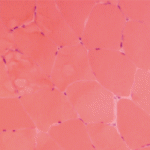“Although the mechanism underlying improvement remains unclear, we postulate the PCSK9 inhibitors may ameliorate autoimmunity in these patients by reducing HMGCR levels,” write the study’s researchers.
A Closer Look
Testing for anti-HMGCR autoantibodies enabled researchers to find this rare group of patients who seem to develop autoimmune necrotizing myopathy after exposure to statins, Dr. Christopher-Stine says.
“We were pleased to see that patients not only had excellent efficacy with regard to cholesterol reduction with the drug, [but] they also tolerated the drug well and there was no obvious exacerabation of their underlying myopathy with the use of this new class of cholesterol medications,” she says.
Dr. Christopher-Stine is also pleased that patients who may experience a potentially devastating side effect related to statin exposure may have the chance to effectively reduce their cholesterol with PCSK9 inhibitors as an alternative.
Anca D. Askanase, MD, MPH, director and founder, Columbia University Lupus Center, and associate professor of medicine, Division of Rheumatology, Columbia University Irving Medical Center, New York, thinks the findings are positive. “These data are intriguing and provide encouraging evidence for the more extensive use of PCSK9 inhibitors in high-risk patients,” she says.
Dr. Christopher-Stine and fellow researchers plan to further explore the use of PCSK9 inhibitors in this patient group. “We are also interested in those patients who require cholesterol reduction and have these autoantibodies but are statin naive. It will be important to determine whether these patients are equally able to tolerate this class of drugs, which we would expect to be true,” she says.
Vanessa Caceres is a medical writer in Bradenton, Fla.
Reference
- Tiniakou E, Rivera E, Mammen AL, Christopher-Stine L. Use of proprotein convertase subtilisin/kexin type 9 (PCSK9) inhibitors in statin-associated, immune-mediated necrotizing myopathy: A case-series. Arthritis Rheumatol. 2019 Oct;71(10):1723–1726.



